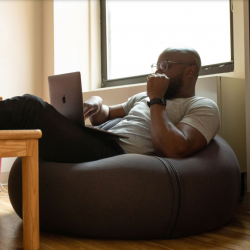To provide the best experiences, we use technologies like cookies to store and/or access device information. Consenting to these technologies will allow us to process data such as browsing behaviour or unique IDs on this site. Not consenting or withdrawing consent, may adversely affect certain features and functions.
The technical storage or access is strictly necessary for the legitimate purpose of enabling the use of a specific service explicitly requested by the subscriber or user, or for the sole purpose of carrying out the transmission of a communication over an electronic communications network.
The technical storage or access is necessary for the legitimate purpose of storing preferences that are not requested by the subscriber or user.
The technical storage or access that is used exclusively for statistical purposes.
The technical storage or access that is used exclusively for anonymous statistical purposes. Without a subpoena, voluntary compliance on the part of your Internet Service Provider, or additional records from a third party, information stored or retrieved for this purpose alone cannot usually be used to identify you.
The technical storage or access is required to create user profiles to send advertising, or to track the user on a website or across several websites for similar marketing purposes.
 The impact of the nation’s deteriorating mental health from Covid-19 lockdowns and other restrictions cost UK businesses £14bn last year, according to a study by Westfield Health. The cost of absenteeism from work due to mental health reasons increased last year by £1.3bn from 2019’s totals as work from home, travel restrictions, furlough and pay cuts changed the workplace for millions of people across the UK. (more…)
The impact of the nation’s deteriorating mental health from Covid-19 lockdowns and other restrictions cost UK businesses £14bn last year, according to a study by Westfield Health. The cost of absenteeism from work due to mental health reasons increased last year by £1.3bn from 2019’s totals as work from home, travel restrictions, furlough and pay cuts changed the workplace for millions of people across the UK. (more…)







 The COVID-19 pandemic is driving a fundamental shift in the way companies operate, accelerating the need for an adaptable and agile workforce to drive business success. According to
The COVID-19 pandemic is driving a fundamental shift in the way companies operate, accelerating the need for an adaptable and agile workforce to drive business success. According to 
 For now, just forget the
For now, just forget the 
 Generating £27.8 billion gross value added annually, and employing more than 360,000 people, the West Midlands is the UK’s largest centre for business, professional and financial services (BPFS) outside London. Now, business leaders from Shoosmiths, Wesleyan, Bruntwood CBRE amongst others, are working with the region’s just under 12,500 leading tech and digital companies to see how they can integrate AI and advanced technology into their everyday activities.
Generating £27.8 billion gross value added annually, and employing more than 360,000 people, the West Midlands is the UK’s largest centre for business, professional and financial services (BPFS) outside London. Now, business leaders from Shoosmiths, Wesleyan, Bruntwood CBRE amongst others, are working with the region’s just under 12,500 leading tech and digital companies to see how they can integrate AI and advanced technology into their everyday activities. 
 The UK jobs market recovered 170,000 jobs in January as the COVID-19 vaccination roll out boosted employer optimism, claims new research from job search engine
The UK jobs market recovered 170,000 jobs in January as the COVID-19 vaccination roll out boosted employer optimism, claims new research from job search engine 
 When the COVID-19 crisis hit the UK in March 2020, many commented that the virus didn’t discriminate and that its impact would be felt equally by everyone. However, as highlighted in Nuffield Health’s
When the COVID-19 crisis hit the UK in March 2020, many commented that the virus didn’t discriminate and that its impact would be felt equally by everyone. However, as highlighted in Nuffield Health’s 
 Lockdown meant that the choice to work from home was made for us. However, for many the decision to continue to do so post-lockdown will be a personal choice. The question we should all ask ourselves is, whether when we are outside of any lockdown restrictions, is working from home really a workplace revolution or simply an act of selfishness? For thousands of workers who’ve spent years of their lives commuting to offices that feel more like soul-less factories than inspiring and engaging workplaces, it’s no wonder that enforced work from home has proven popular.
Lockdown meant that the choice to work from home was made for us. However, for many the decision to continue to do so post-lockdown will be a personal choice. The question we should all ask ourselves is, whether when we are outside of any lockdown restrictions, is working from home really a workplace revolution or simply an act of selfishness? For thousands of workers who’ve spent years of their lives commuting to offices that feel more like soul-less factories than inspiring and engaging workplaces, it’s no wonder that enforced work from home has proven popular. 
 A new report of over 1,000 small business owners and decision makers by
A new report of over 1,000 small business owners and decision makers by 
 Smart Building Certification, the organisation behind the smart accreditation, awarded its first platinum building. The founders of Smart Building Certification handed the first official platinum certification over to Coen van Oostrom, Founder and CEO of EDGE.
Smart Building Certification, the organisation behind the smart accreditation, awarded its first platinum building. The founders of Smart Building Certification handed the first official platinum certification over to Coen van Oostrom, Founder and CEO of EDGE. 
 Employee engagement levels may have actually improved during the COVID-19 pandemic, claims a recent survey undertaken by intermediary
Employee engagement levels may have actually improved during the COVID-19 pandemic, claims a recent survey undertaken by intermediary 
 New data analysis by web design and development agency
New data analysis by web design and development agency 








February 10, 2021
Ten point green plan needs to be embraced by organisations
by Paul Scriven • Comment, Environment